Note: I wrote this on election day 2016, before the results were in. At that time, it was just a conceptual exercise. After hearing the election results, I’m taking it a bit more seriously.
After waiting in line to vote today, I got to wondering how the democratic process could benefit from modern-day design thinking.
If there’s one thing we’ve learned from the 2016 election, it’s that, as online news magazine’s have discovered, appealing to people’s appetite for controversy is a great strategy for getting noticed in today’s crowded media arena. With so many voices shouting for attention, truth and thoughtfulness are quickly eclipsed by insult and sensationalism.
But the more inspiring success stories of the Internet age have arisen from a less pessimistic outlook. Companies that have sprung up in the sharing economy – companies like eBay, Airbnb, YouTube and Uber, found their strength by designing with the assumption that individuals are, for the most part, good-natured, trustworthy and capable of self-regulation.
At this point, however, the democratizing benefits of the internet have failed to democratize democracy itself. We hear a huge number of voices speaking out about every conceivable political issue, but they’re quickly sucked into the cacophony before they can be consolidated into a unified course of action.
American Democracy, as wire-framed in the constitution, was, and still is, a well-designed solution to the problem of connecting the thoughts of a country’s widespread populace to a more concentrated sub-population of representative decision-makers. It was also designed in 1776 before anyone could have predicted that we would have a massive electronic infrastructure in place to accommodate a ridiculously granular level of opinion sampling.
With that in mind, I thought it would be interesting to set aside the security challenges, the technical limitations and the many use-case exceptions that prevent us from adopting an internet-based direct-democracy, and just go ahead and design a few interface screens to see what it might look like if we all had a bigger say in how the federal government operates.
No taxation without representation, please.
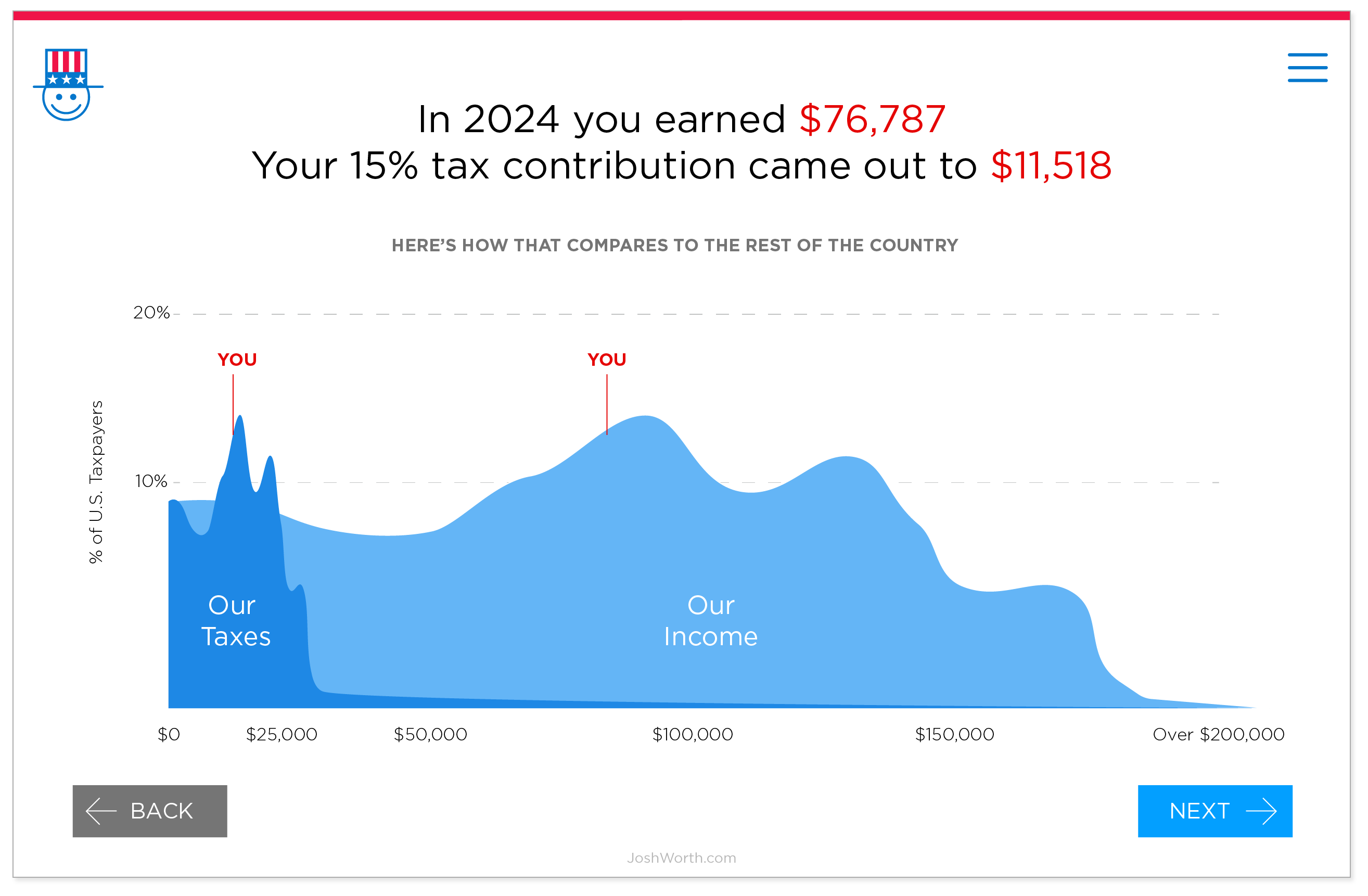
Pay taxes and vote on the same day.
Just take my money
A government obviously requires money to operate, and a big chunk of that money originates from the wages of working people when they pay taxes. I’ve always found it odd that, even though my income is reported to the government by the people who give it to me, I’m still the one responsible for doing the paperwork to make sure I’ve paid the right amount. If my government knows how much I earned, we should also be able to figure out how much I should be taxed. An overhaul of the IRS could streamline this process by tallying the income attributed to me and collecting the proper taxes.
Is there something fundamentally wrong with a 15% flat tax? It definitely seems like a simple, fair-minded way to meet the principles of flat, un-cluttered design that we’ve grown accustomed to. Maybe there could be a few check boxes to account for those who support dependents or meet other criteria that would reduce their tax burden.
It would also be great if public school teachers, veterans, and other public servants could avoid paying taxes on paychecks that are essentially re-purposed tax dollars.
Let me pay taxes and vote at the same time
To many people, the government feels like a big, monstrous “them” rather than the “us” that was envisioned with the phrase “We the People.” I think one reason for that is that the contributions of the common tax-payer seem to go un-noticed. There’s a cognitive disconnect between my role as a taxpaying member of the government, and the role of the people who have been chosen to represent me. Linking the tax-paying process with the voting process would be one way to remove that disconnect.
Let me have a say in how my money gets spent
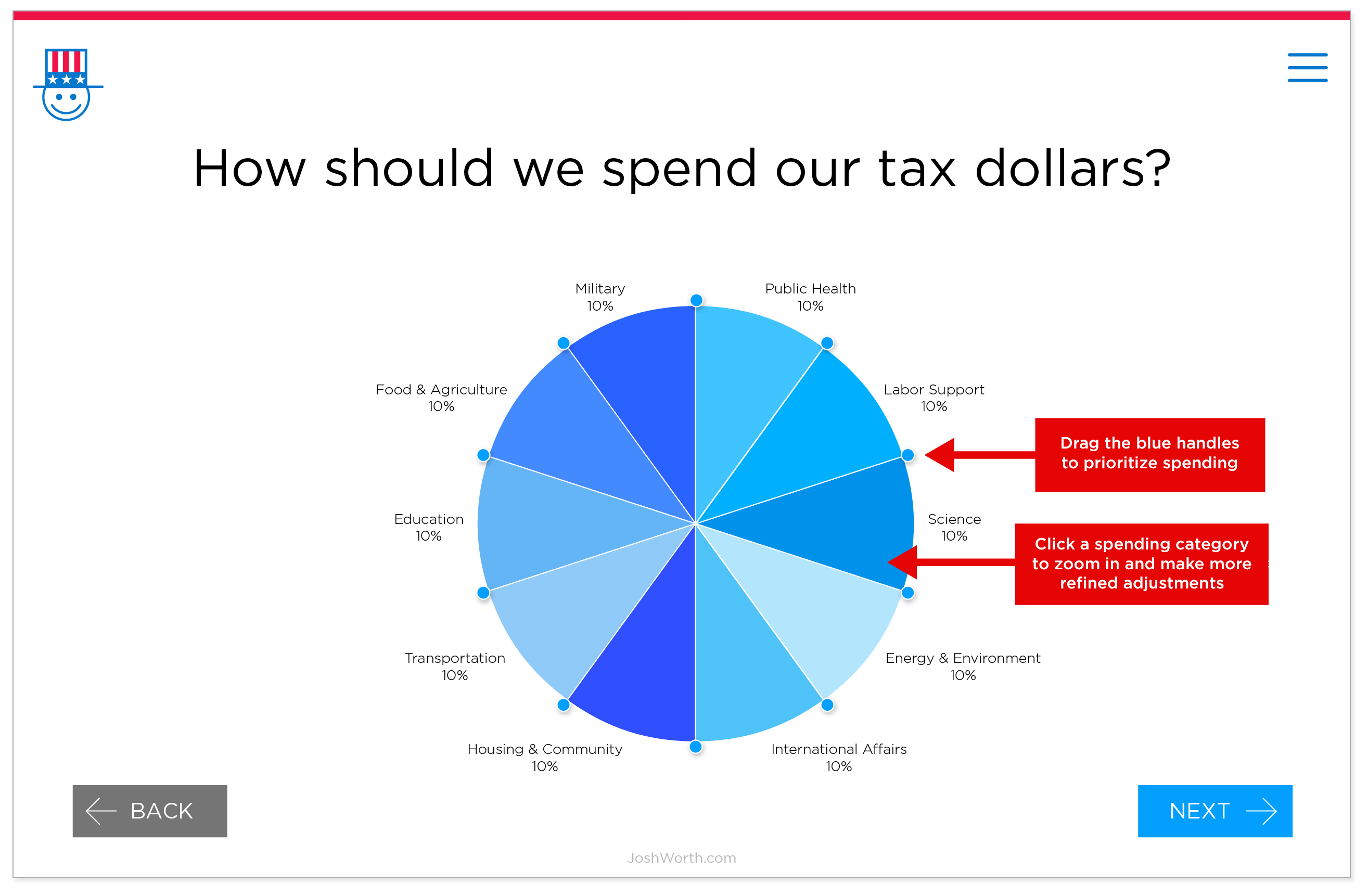
Allow voters to set spending priorities.
A big complaint of disenfranchised voters is “I don’t want my tax dollars paying for ____.” While there’s no way for individuals to specify exactly how each tax dollar gets spent without the rich having a greater influence on budget policy (because that would be unheard of), all opinions could feasibly be averaged in to a federal budget strategy. (The people at The National Priorities Project have a lot to say about the power of this idea.)
Put me in touch with my opinion
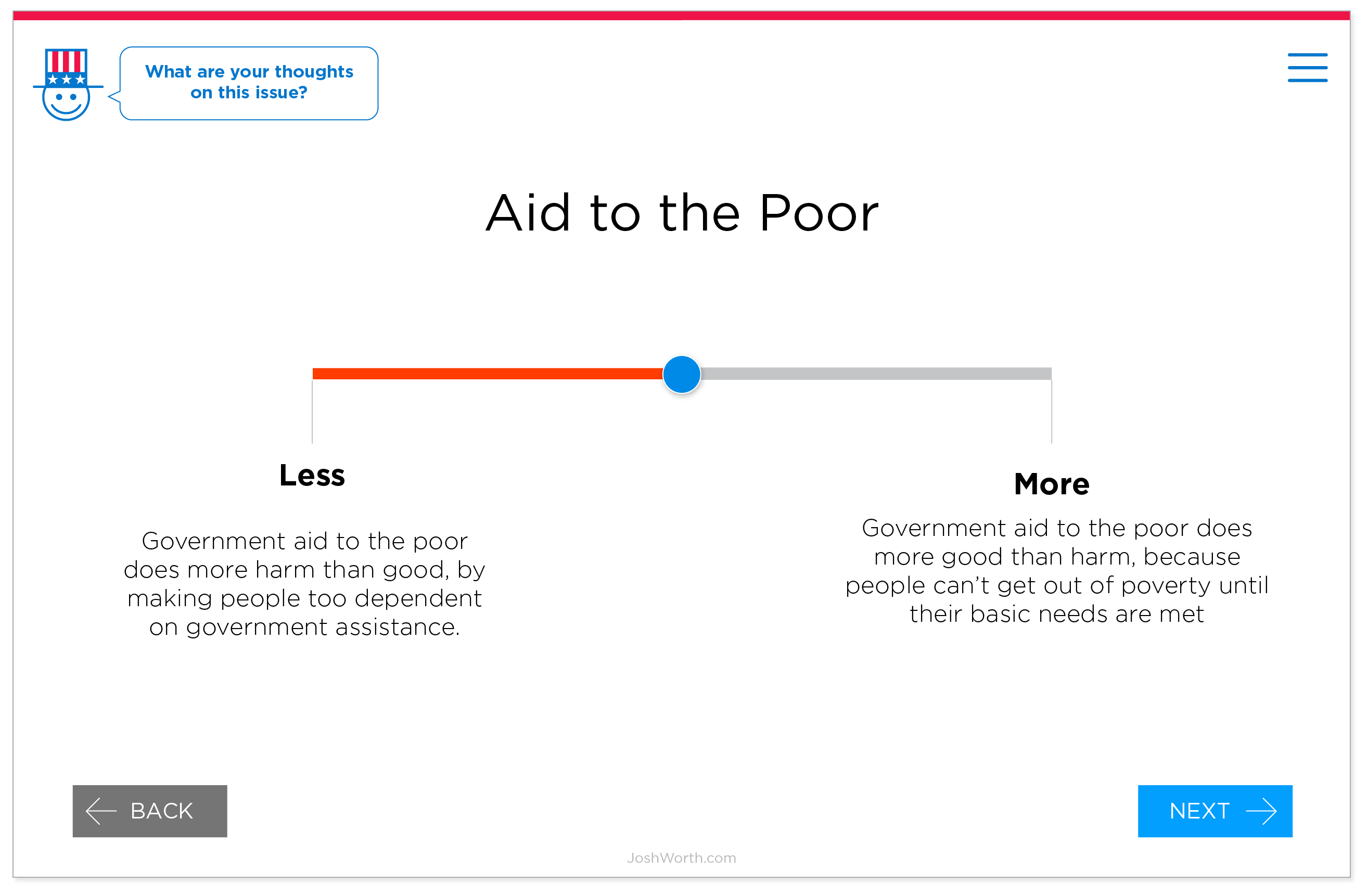
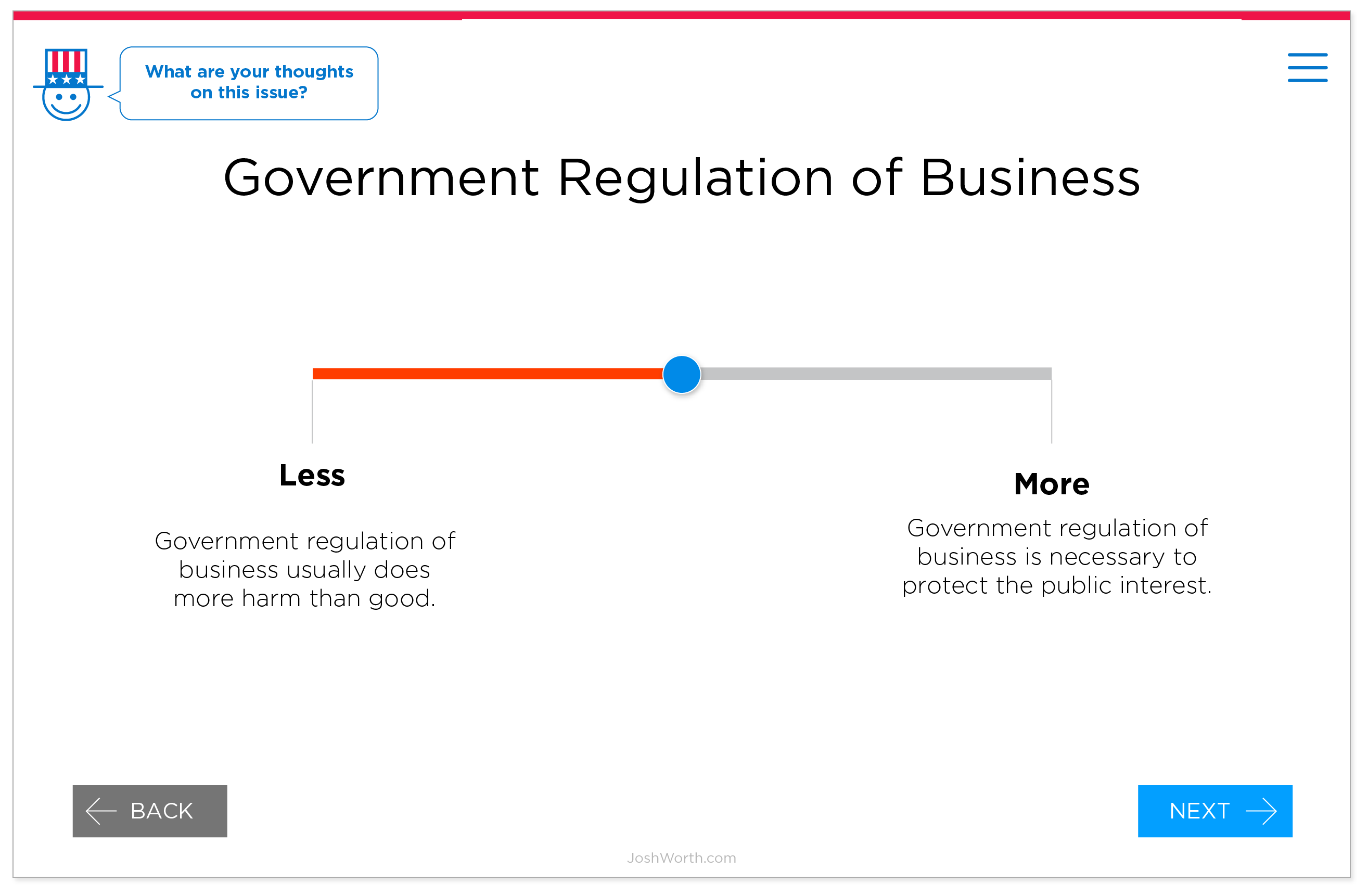
Allow voters to express high-level philosophical opinions
Now that the money is being handled in a more democratic way, the policies that are made need to be informed by our actual beliefs. Not the beliefs that are implanted by media and propaganda, but the actual opinions that are formed in our brains when we experience life and deal with real people. While it’s fairly impossible for people to access their “genuine” thoughts, there are ways to tease them out through questionnaires that avoid buzzwords, hot button language and party rhetoric. A good example is this one from the Pew Research Center.
Find me a representative who actually represents me
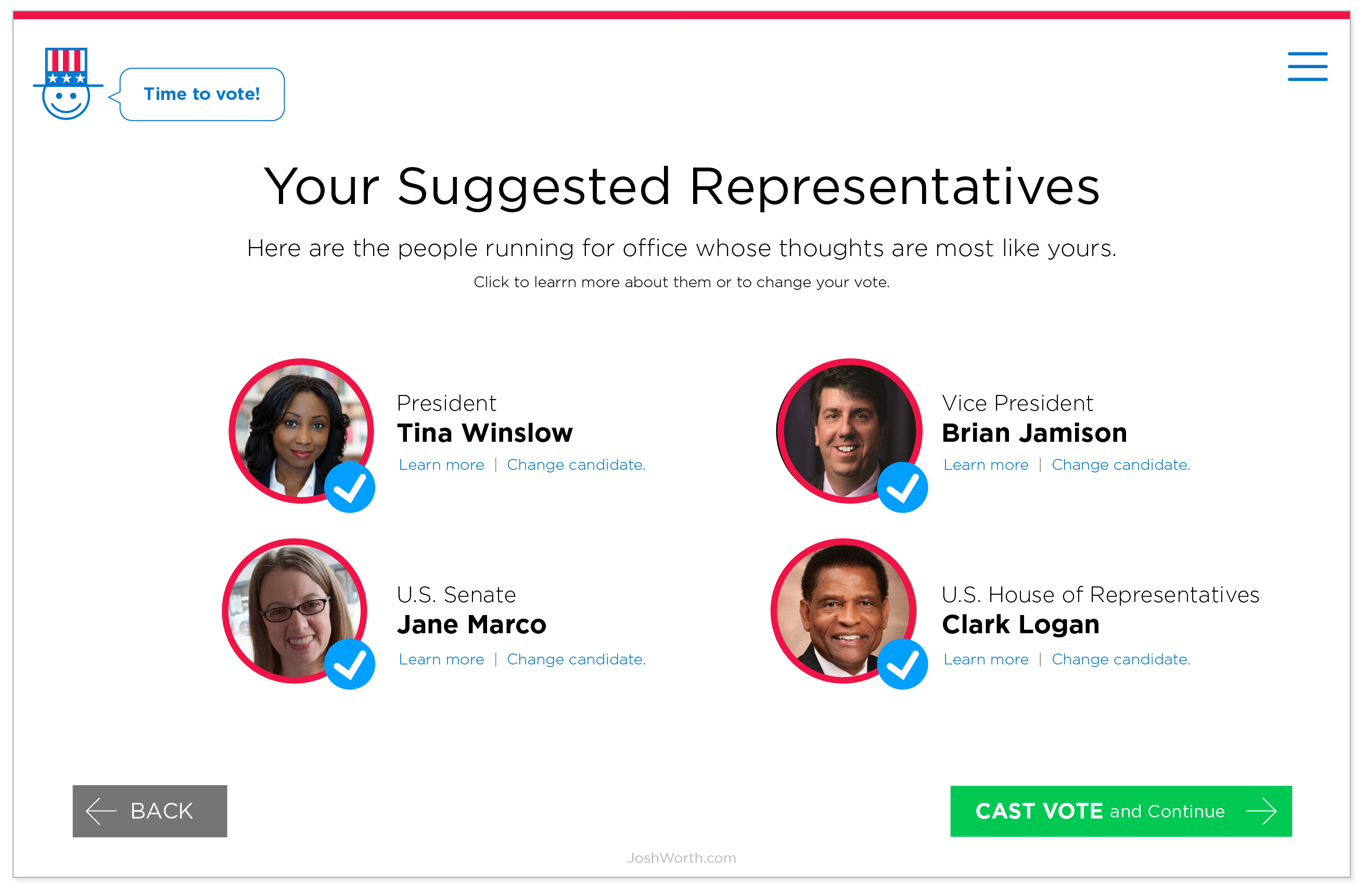
Budget allocation and philosophical leanings could be compared to match voters with like-minded candidates.
With so many great T.V. shows to watch, most people lack the time or resources necessary to dedicate themselves to a life of public service. For the moment, actual human beings are still necessary when devising and enacting policies that serve the public interest.
It turns out, there’s a sub-set of the U.S. population with the right education, the right temperament and the social wherewithal to spend time in politics. Within that subset is an even smaller number of people who share my core beliefs. Today, the process of bringing those people to my attention involves a lot of money, campaign ads, false posturing, and debating. But, upon closer consideration, there’s nothing intrinsic to the problem that requires the use of political parties or primaries. One might argue that limiting ourselves to a handful of candidates for any given seat is only necessitated by the fact that we have paper ballots with a finite amount of space to list names.
In a computerized system, an unlimited number of candidates could be added to a massive database that would match representatives to the people who share their beliefs and positions. Those with the most matches would come to the forefront.












The problem with having hundreds of candidates is that the vast majority of Americans will feel like their vote lost.
Also, people will be extremely suspicious of any computer algorithms used that way. Imagine how easily a rogue programmer could tip the scales. Whether or not such a hypothetical scenario is likely, you can guarantee people WILL imagine that.
As for the high-level philosophical questions, a less direct form of that already exists through sites like vote411.org and isidewith.com.
Interesting concept, though. A lot of your ideas are completely novel to me, and that’s saying something. Cutting out income tax on people who already get paid with taxes would mean such people get “paid” a “lower” salary, but don’t have to do any paperwork beyond tax credits and such. Those credits could then be added directly to the effective salary.
I like your thinking. Government is supposed to be for the people, by the people.
If policies & financials were handled by the people, there would be less grovelling. However, I suspect that the majority would be disgruntled by the effort and time required to think and act if it were an annual task.
However, if it were every 3 – 4 years, as per elections, it would probably cost just as much time and effort.
Instead of marketing electorates, the media could be used to market policies and discuss expenditure. Then instead of a single party running the government, we could have politicians most suited to the task allocated. What a difference that would make.
All caveats aside, this is fresh thinking and very 21st century. even 22nd. Implementation being one of those caveats, it will have to remain far off.
While I’m here, I also really like this. There are other projects like the less-fortunately acronymed “TOOP” (The Once-Only Principle) that are endeavoring to ease people’s interactions with government. There was even a whole piece in the New Yorker on steps that Estonia is taking to digitize their own society, and Japan’s “Society 5.0” push seems destined to reach into the same area of thought. Great thought experiments here.
The main problem with voting on where the budget money goes is – people are stupid. A facebook or twitter post would go around talking about Fruit Fly Funding and 6 billion people would suddenly want to put a large part of our budget toward it. I think, inevitably, the people in charge would look at the results and say “well we can’t do that…” and we’d be back where we started.
This is all well and good but about 90% of what the federal government does these days is unconstitutional. It all needs to be abolished unless it is specifically authorized in the constitution which is a contract between us and the people we hire to run the country.
If a plumbing contractor violated his contract the way the people in the federal government have done, they would be in jail.
If you want things that are not authorized to the federal government then you need to amend the constitution not ignore it. For instance, nowhere in the constitution does it authorize our government to give our money to foreign governments or to any sort of charity.
Before you start wanting to change it, perhaps getting it to work the way it’s supposed to work would be a better idea. The first thing I’d do is put term limits on ALL elected offices. No more than 2 terms in office for anyone. If it’s good enough for the office of president it’s good enough for everyone else. Next I’d limit congress to no more than 3 months in Washington DC each year.
I’d like to see a body of people similar to the supreme court who’s only job is to find stupid or outdated or unconstitutional laws and abolish them.
I’d love to see a flat tax with a set deduction per person.
BTW, If you read the 13th amendment, then you consider what the military draft does, it becomes clear that the draft is unconstitutional. it’s involuntary servitude any way you look at it. Men are still required to register for the draft and that seems to be a clear violation as well. Not to mention that it is discriminatory to men.
To those of you in the comments section…He starts out by saying that this is a hypothetical situation where he sets aside all security issues and potential flaws.
Very good ideas! With the current Biden/Trump fiasco in progress, now would be the perfect time to bring it in. Same could be done for the Judiciary and other decision makers who are important to our society.
lol its done
And im glad
great prez
the main problem is that they’res never a candidate that you want It’s always choosing the lesser evil
This is cool… where can i find the website that has thooose pics?